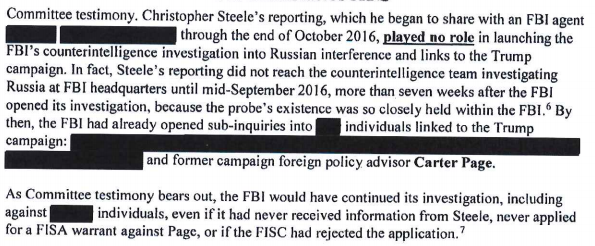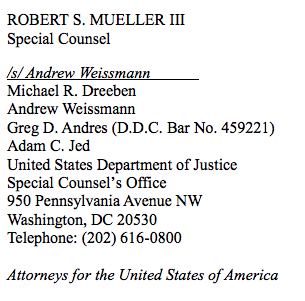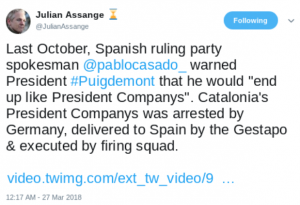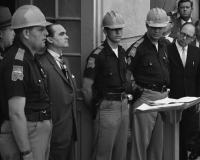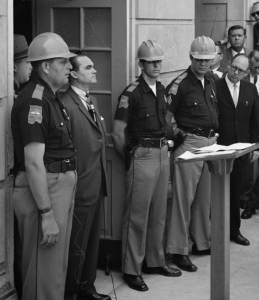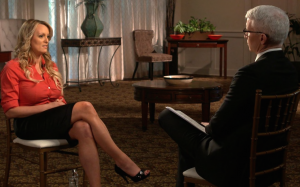Lt. Gen. Michael T. Flynn spoke in front of the Young Americans for Freedom a week after the 2016 election. His language is worth noting.
I’d seen this speech shortly after the inauguration and found it disturbing at the time, given its references to insurgency and revolution and borderline incitement. Now that we know more about foreign and domestic influences conspiring to defraud the U.S., Flynn’s speech is even more disquieting.
Following is a transcript of the speech embedded here; you may want to watch the speech in case it gets taken down. I’m skipping the rah-rah fluffy intro speech. It’s not really necessary; it includes highly predictable insults to the previous administration.
(An aside: the way he hangs onto and hugs the introductory speaker is icky. She looks distinctly uncomfortable at one point.)
[Begin 3:41] Well, um, somebody mentioned Dinesh D’Souza, I was with Dinesh D’Souza last night, and uh, and the other, for the young audience here, for the young ones here, and I mentioned it to a couple guys also with Milo Miopolous (sic). So, see a lot people in here won’t know who he is. I tag him on Twitter, you know, because he’s a phenomenal individual, and for, I’m mentioning him tonight, because he spoke alongside me last night to another group of folks and you know he’s definitely, he’s one of the most different, most brave people I have ever met. We have different views on different things, but he is deeply, deeply conservative in his views about this country. [4:36]
And uh, so he is going around this country at the undergraduate in our colleges and universities and he is fighting for you, for all of the people in here. We had two individuals last night, one from Bucknell and one from UC-Irvine who was with us, they were the presidents of the Republic associations of their schools, talking about their, what they were being assaulted for, they were being condemned for, [4:42] you know, and then all of a sudden of course we had the big victory on Tuesday and everybody broke out the red hats and was walking around campus.
But um, so you know what you are doing, what you’re doing is amazing, not only in this foundation, but also what you young people are demonstrating. I’m going to talk bit about that because this, this is about having courage, this is about having courage. When you think, when you think about what Donald Trump, you know, right here, right? (patting name on podium) I mean that, that, unbelievable, and I’m not sure, if this is probably the first time somebody actually used this room, maybe, huh? Maybe it probably is for an event like this. When you think about what DonaldTrump, what president-elect Trump and his family endured over the last eighteen months plus, and you can just count down the number of organizations and people on both sides of the uh, on both sides of sort of the electorate, right, on the establishment side. This was not an election, this was a revolution. [6:17] This was a revolution. And I have, uh, been doing this a bit for him.
One of the things that occurred in this revolution is, and I was just talking with Attorney General Meese about this [6:32], this was a digital election. Because the media, the normal media, ninety-nine percent of the media, was not on Donald Trump’s side, not on president-elect Trump’s side. And you saw the bombardment, the constant barrage and attacks every single day. I was with him one time, and we’re flying somewhere, and uh, you know we’re flipping through the channels on his plane, and like every single, every single channel we went to, it was him, it was a negative, a negative thing about him, but he’s like, “God, you can’t get better press than this,” you know? It was unbelievable. I mean, why not? So he’s like, he says, “Why the hell should I spend a dime on ads?” Right? I mean, and what happened was, he knew. Think about this, he’s essentially a real estate developer, he was a real estate developer, and in real estate, in real estate you find underappreciated real estate, you buy it, you develop it, and you sell it at a higher price, make some money, right? You find underappreciated real estate, and he did that, very well, for his whole life, pretty much, many of the things he was involved in. [8:00]
What he put his finger on, what he put his finger on was tens of millions of people in this country who felt deeply underappreciated by our government, by Washington DC. And he did it in a way that nobody saw, he did it in a way that everybody said, ah, this is a flash in a pan. This guy’s a joke, okay? When you think about it, about what he achieved, this is, and actually I was just, uh, in fact I was just going through social media ’cause social media is the only thing reporting it, and uh, I was just telling the folks at my table that he, uh, so he won the electoral college, obviously. The final count right now was that he got 306 to 232. But they are reporting, but the media’s not reporting this, this is being reported in social media. I’m going to spend a little time talking about social media, because there’s so much power in social media for your generation, for your generation. So it’s being reported now, and it’s flying around in social media, that he also won the popular vote in a big way, [9:16] probably somewhere close to, we’re looking at maybe seventy, maybe, to ninety thousand overall, but it could even be, it could even go higher because the mainstream media does not want to, they did not want to report Michigan. ‘Cause they felt so bad having to report Arizona. Now, you know, I can stand up here and say it doesn’t matter ’cause all he needed was 270, know? But it does matter, it does matter. [9:41]
Because there are millions and millions of people, and I’m going to tell you we have two big problems in this country, two huge problems, one is Hollywood, and one is right down the street here, okay? We have two big problems, and you, you, young Americans, you’re the ones who are going to have to figure out, because we, we must, you have to, you have to fight for this country, you have to fight for this country. You can’t sit back. You have a responsibility. You can’t sit back. You’re part of something special. You’re here, because you’ve made a decision about something in your life, okay? You’ve made a decision about something in your life, and it’s really super important, super important. We cannot lose sight, we cannot lose sight of what our country was built upon, and we should not fear, we should not fear what our country is built upon. Our country was built upon the Judeo-Christian principles and values that make up our Constitution. [10:48] And our country is about individual liberties, it’s not about liberties for the government, it’s about liberties for the individual, individual rights. Just look at our Bill of Rights, it’s all about individual rights. Right to bear arms, peacably assemble, practice whatever religion you want honestly. So it’s individual rights, you have the right to go out here on the steps of Trump Tower and yell bad things about the next president. Or the current president, as long as you don’t, you know, do it in a damaging or a hurtful way physically. We allow that, right? It’s crazy, but we do it. It’s individual rights. That means you have the right to decide what you want to do, you have the right to decide what you want to do. [11:38]
So I will tell you that, uh, in the world of sort of digital media, ’cause I think this is super important to you all, ’cause it’s going to change again, going to change. I’ll give you one example. We were, on a Sunday afternoon just about a month ago, on a Sunday afternoon, we’re in our third stop, and we’re sitting there, and we, we’re going to Colorado the next stop, but we were go into Pueblo, Colorado. We ended up going into a place called Grand Junction, ’cause we had not been out into the western side of Colorado in all the stops. I don’t know how many people are here from Colorado, but, uh, but so we’re saying, okay, let’s, we’ve gotta’ go out and sort of touch the people out in the west, ’cause it’s very sparse in terms of populated area. And so, Sunday afternoon, we’re trying to figure out, well, we made some calls, how many people will show up, what’s the town we want to go into. We into a place called Grand Junction, it has about, like I think the population is about five thousand. So they said, well maybe we’re going to get in there about three o’clock in the afternoon, probably you’ll talk at about four, so maybe people will out of work, will come out of work, maybe there will be a few kids who’ll come out of school. [12:49] So, we said, how do we want to, you know, so let’s make some calls, let’s see what we want to do. So we gotta’ literally about thirty minutes later, yeah, we think we’re going to get about two thousand. So Trump said, let’s make, let’s go, it’s worth it, he hadn’t been out there, we have the time, and we’re traveling, we’re moving. So then we said this, why don’t you tweet out, tweet out, that you’re going to be in Grand Junction, Colorado tomorrow, that you’re going to arrive at three o’clock in the afternoon, okay? And that was about four-thirty the Sunday before the Monday that we showed up. Eleven thousand people showed up. [13:31] Eleven thousand, yeah. I mean, eleven thousand people showed up to a place, I mean, it’s a beautiful little place in the middle of nowhere. I give you that example because we have many of those. We have many of those. And we have an army, ‘kay, as a soldier and as a general, as a retired general, we have an army of digital soldiers. What we are now, what we call, what I call them, ’cause this was an insurgency, folks, this was run like an insurgency. This was irregular warfare at its finest, in politics. [14:11]
And that, that story will continue to be told here, but we have what we call citizen journalists, ‘kay, because the journalists that we have in our media did a disservice, to themselves actually more than they did to this country. They did a disservice to themselves because they displayed an arrogance that is unprecedented. And so the American people decided to take over the idea of information. They took over the idea of information [14:52] and they did it through social media. How many of you know about Periscope? ‘kay? Raise your hands up, it’s okay to raise your hands up, I’m not going to give you a question, I’m not going to give you a test question, yeah, okay, good.
Periscope. I didn’t know about Periscope until a few months ago, didn’t know about it. I watched one individual who’ll be nameless here, but one individual who has 650 thousand followers just on Twitter, which these days doesn’t seem like a lot but it’s a lot, enough. [15:28] This individual is a huge influencer, so he’s, we title him, he’s an influencer, ‘kay? So he puts out, he puts out a tweet to his 650 thousand followers, and says, “I’m going to be on Periscope doing a live media broadcast in fifteen minutes,” one-five, fifteen minutes. 35 million people viewed that. 35 million. Because everybody said, hey, because the guy’s great, he’s great, when he talks he’s out there, I mean, and he is a, he’s an American patriot, he’s an American patriot.
[16:09] So when we talk about patriotism, how do we fight as patriots today? We fight at the voting booth, we fight in our schools. You know in the military, when you’re a young officer or sargeant, corporal, private, you know we expect, we almost demand, we demand those individuals to be demonstrate physical courage, to be fearless. Demonstrate physical courage. Why? We want them to do it in, on the physical exercise field, we want them to do it in the very physical demanding extremes we put them through on training, because we want them to demonstrate physical courage in the face of all odds on the battlefield. The more senior that you get, and I learned this, but actually I, I am, I completely believe the opposite now for our younger generation. And it’s the most, the more, the older you get in the military we sort of begin to change that physical courage to what I call intellectual courage. And intellectual courage actually takes more bravery at times. Takes more bravery at times. Because to be intellectually courageous, and this is for you, this is really for this foundation, this is for the young people in this room, you are, you are demonstrating a level of intellectual courage that our country desperately needs.
[17:48] So for this election, for this particular election, I’m going to be professional, I’m going to be humble, because I think that’s a characteristic of the American, of just the American, of the American patriot. It’s humility in the face of odds, right? A good winner, not a sore loser, but we don’t have to be polite. In fact we have to stop being polite for our principles. We have to stop being polite for our values. We have to stop being polite for what we stand for. We have to stop apologizing for who we are and what we believe. We cannot have that anymore. And that’s you, so I’m looking and I’m trying to pierce through the lights that are in my eyes (sic) and looking at the young people.
[18:44] I’ll tell you two things I learned from my parents. Both of them are deceased now, my father was a World War II and Korea veteran, my mom, a wonderful, wonderful lady, she just died a year ago, a little over a year ago now, one of nine kids from a very small town up in Rhode Island, the state of Rhode Island. And they taught us all two things. The thing that my father taught me, was to treat, the Golden Rule, the Golden Rule is what you, is what existed in our home. Treat others like you want to be treated. That’s the Golden Rule. Treat others like you want to be treated. And you’ll, and if you do that and if you go through life it’s the old adage by the time you’re ten years old you’ve learned to say Yes, ma’am, No, ma’am, Yes, sir, No, sir, thank you, please, all those little things. If you just use those words routinely, you’ll be highly successful in life with a few other, a few other traits that are brought out as you get older. [19:45] But treat others like you’d like to be treated. That’s what he taught us.
[19:50] The thing that my mother taught us was, my mother was an educator. She was a, she was, she got her law degree at the age of 69 years old. I mean uh, phenomenal, that’s after having nine children and moving around and all the kinds of things that you do. Because she was passionate, she was passionate about learning, and the idea, the notion to be a lifelong learner. Never stop learning. Never stop learning. Go to every single thing, look, you know, read, travel, pay close attention to what you’re doing. And I, I joke about this sometimes, and I say because of my own sort of upbringing and my own, uh the fight, and there’s mom in the middle of those nine, fighting for a position, fighting for a position I’m the ultimate [garbled] act of compromise, compromise a guy out of a pair of socks.
[20:52] So what I’m saying to you is that you have to think about what is it you plan on doing in your life, and you’ll find that there’s a path out there that will have many, many exits. And you have to decide do you stay on that course, and what is that course, is that course something that is, that is inherently part of your being. Is it you and your principles, you and your values, what your belief systems are, ’cause they will change. And there will also be other life changes, also be many other life changes.
[21:29] So a couple of things, because I think this is important on veterans, on veterans, on veterans I’m going to talk because this is Veteran’s Day weekend. And I’m not going to go without reminding people that if you watched the news today we had four killed in action in Afghanistan. Today. Fourteen wounded, numbers may go up a little bit in um, Bagram, Afghanistan. You know, and my wife, my wife got a text from a very good friend of mine when I was a brigade commander he was a battalion commander of mine, Mark Costello, and his wife Barbara. My wife texts, or my wife texts me with a message from his wife and says, “Hey, our son is serving in Bagram, is there anything that you guys can find out?” and I mean, you don’t know, so we went back, gave her some guidance on you know they called up the, the rear detachment, all this, because they’re very close, my wife and this gal Barbara are very close. Because it happened and it was big and it was a large gathering, her son is the commanding general’s aide for the unit that’s at Bagram. So there was an event and in this case it was a running race that they I guess we do there fairly routinely.
[22:46] Well, her son was wounded this morning. Thank God he wasn’t killed, but he was wounded, he was wounded pretty severely and he’ll re– he’ll probably recover, but he was wounded pretty severely. So, we must remind ourselves we’re over, we, the United States military, are in over a hundred countries. Right now we are engaged in direct combat in seven. Seven countries. So, on this Veteran’s Day weekend as we reflect about what just happened in this country, what just happened, we just went through a revolution. This is probably the biggest election in our nation’s history since bringing on George Washington when he decided not to be a king. That’s how important this is. You can compare this to Reagan, you can compare this to FDR, you can compare this to Teddy Roosevelt, you can compare this to Abraham Lincoln. But I’m telling you there’s no comparison. And the reason why I say that is the reason why I’m standing here, the reason why I decided to do what I, I’m doing because there is a sense, there is a sense in this country that we were going in a direction that was irreversible. It was irreversible to the point of, you know, it’s cool, and you all know this, all of you that mess around with this different college organizations so bravely. You know it’s cool to be called progressive, right, it’s a cool word. I’m a progressive. Who doesn’t want to be progressive? Right? I mean, it’s a cool thing to be, right? Progressive is socialism. Progressive equals socialism. The riots and the protests that we have out on our streets tonight, last couple of nights, that’s not Donald Trump’s fault. I mean, everybody’s blaming Donald Trump. It’s not Donald Trump’s fault. That’s the corruption in our government. That’s the sickness in our system. [24:50] That’s the lack of jobs and safety and security in our inner cities. Those are the kinds of things that people are protesting about. Now there’s some, you know, some paid anarchists in there, I can tell you that, I can guarantee it, you know in fact I know it for certain, and they’ll be dealt with through our law enforcement system. You know, we’ve had an assault on our law enforcement system. We can’t have an assault on our law enforcement.
[25:27] The most, the biggest strategic advantage that our country has, more than any other country on the planet, is something called the rule of law. I’ve been on six continents and I’ve been in some of the worst places that a human can go to, and seen some unbelievable things. The rule of law can never, can never break down in this country. It must never break down in this country to a point where people begin to wonder is it, you know, what’s going on here? and getting concerned. And when you don’t have leadership, when you don’t have leadership that stands up and says, “Hey, this is wrong! Stop it!” And here’s what we need to do. We have, and we experienced an incredible deficit of leadership. In my, in my first meeting with Donald Trump, because I’ll tell you, my, for me personally, the last time I was involved in politics was when I was in high school. Heh, you know, I mean, you’re, it’s like somebody said, “Hey, do you want to run for student class, you know, president?” because nobody else wants to and the election’s today. You know, okay, and you’ve got to go handle like the Coca Cola machine money or something, you know? Seriously. And I find myself here today, because we, we have a country, I know, I know what this country’s about. I know the threats that we face. I know the threats that we face. You knoW, and there’s people that think, “Aw, there’s nobody out there that wants to see our way of life go away.” Well, there’s plenty of people. There’s entire nation-states that do not appreciate the American way of life. And that’s why we have to fight for it, we have to fight for it. we find ourselves fighting for it more right here at home, sometimes, and especially in the last, in this political cycle, this political madness that we’re going through. But I’ve seen it, I’ve seen it now for probably the last two decades of my life. [27:40] And for me personally, I felt something, and that drove me to challenge, I mean in the intelligence business, it’s always truth to power, [garbled] do you always sort of challenge, the, always sort of bucking the system, because you know, nobody likes, nobody wants to see you, because it’s never good news. Nobody wants to see you, but I’m standing here, I, I get a call and asked to come up to New York to see Donald Trump a while ago, this is like the summer of 2015. And we met, wonderful, just a wonderful individual, just an incredibly wonderful person. Loves this country.
[28:28] And I, sitting down with him, I really only had two questions that I wanted to ask, and then we talked about the world situation and a whole bunch of other things. We spent a couple hours that day. And my first question was “Are you serious?” you know, because I’m a serious guy, and I’m not going to waste my time if you’re not serious. And so he convinced me that he was serious. He said, “Yeah, I’m absolutely serious. I’ve been paying very close attention to what’s going on and I just, I can’t, I, for me,” him, speaking about him, “for me this is my last chance if I think I’m going to help this country.”
‘Cause the second question really had to do with that. Second question was, which I think was the most difficult question to answer, and it was never asked in any of the debates. Chris Wallace kind of touched on it at the very end, but this is the most difficult question. The question is, why do you want to be president? Why do you want to be president? And he convinced me in about five minutes how much he loved this country, how much he saw what was happening to it, and how much he felt like he could actually do something about it.
And that to me, I was sold, I’m like, wow, and sort of from that moment on, my direction in life completely changed. And things like that are going to happen, particularly for the young folks in the room here. I’m going stop here in a second because I know we’re going to take a few questions here tonight, ’cause I was asked to maybe answer some questions from young folks here. But you know this and all the older folks here know that, that your life direction will change and could change on a dime sometimes, you know, it will change. And so what I ask you to do is reflect on what just occurred, study it, think about it, talk about it, debate about it, act, act on it.
[30:36] You know, one of the things Abraham Lincoln always used to say was, “Actions speak louder than words.” You know, and I think the Gettysburg Address, amazing, amazing, and I think it was 85 words in two minutes, wasn’t really even recorded at the time other than what they had on his notebook. It wasn’t until a couple years later when people started to go, “Whoa, look at this thing,” you know, where he says, “Let us not forget,” and he discusses and describes the sacrifice, that, this case, talking about the Battle of Gettysburg, where he talks about Americans who gave the last full measure of devotion on behalf of our country. On behalf of the United States of America at that time. Amazing, amazing resilience, amazing toughness. Not anger, determination, determined to protect what it is that we have.
[31:40] And so, I think, I believe this foundation, what you represent, so for the sponsors that are here I thank you so much for, you know, continuing to kind of strengthen this, this, this, you know, great idea. But for the young people that are here, you know, this is, you have to, you have to fight for what you believe in. You have to be prepared to fight for what you believe in. And you have to serve, you have to serve. You decide how you want to serve our country, whether it’s in uniform or whether it’s in some other capacity. Doesn’t matter. Serve this nation. Serve it bravely, serve it boldly, serve it honestly. If you want credibility, others will give you credibility. If you want credibility, maintain your integrity. Protect your integrity. People will give you credibility, you have to give yourself integrity.
[32:44] So on that note, ladies and gentlemen, thank you very much and I’ll answer a few questions.
— Flynn has a weak grasp of the Constitution, let alone the First Amendment, demonstrated by his near-proselytization of Judeo-Christian ideology while advocating a freedom of religion.
— The Grand Junction campaign event merits more scrutiny — see Denver Post coverage and compare it to Flynn’s remarks.
— Flynn’s public statements in 2014-2015 were very much at odds with White House foreign policy; he also avoided being direct about Russia when he wasn’t glossing over Russia’s aggression.
— He’s a horrible public speaker. I hope he didn’t talk like this extemporaneously to our troops. I certainly hope this wasn’t a prepared speech. He comes off as disorganized and rambling as a certain resident of the White House.
Depending on whether Flynn had contacts with Russian and Turkish agents before and during the election season — before the post-election transition — I have to wonder if he pleaded guilty because his language and behavior met the definition of seditious conspiracy when it wasn’t captured on public camera. Is this what Team Mueller might hold over Flynn for leverage?






